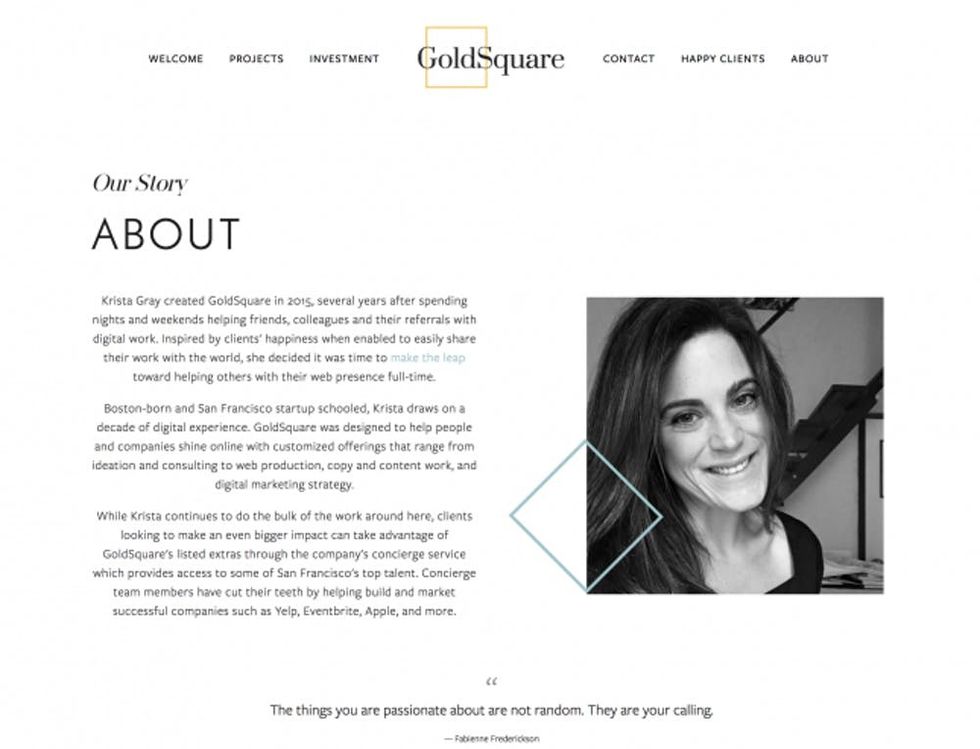Take the stress out of starting up.
6 Key Lessons I Wish I’d Known Before Starting My Own Biz

Moving from New Hampshire to San Francisco in my early 20s meant that I got to take full advantage of building an awesome digital career at innovative startup companies. Lucky me! Over time, though, I slowly burned myself out — and couldn’t seem to ignore the inner urges to try my hand at starting a boutique web production studio (my dream business!). Making the leap from a full-time employee to my own boss has been exciting and a little bit scary at times, even with a solid business plan and savings in the bank. More than a year later, these are the top six lessons I’ve learned.

1. Done is better than perfect. As a business owner, I have limited time and energy reserves to accomplish everything on my to-do list, which means that some things don’t look or work *exactly* as I’d like them to all the time. For example, I’d love to redesign my letterhead, update my deck, and build out my work portfolio with recent projects, but none of these things is stopping me from growing my business. In fact, the current versions are more than enough when it comes to meeting my goals. Sometimes, you just have to roll up your sleeves and GSD while realizing that having a workable version is more important than something that looks pretty or perfect.

2. Networking really is useful. As an introvert, networking has always been a little bit of a challenge for me; but owning a business calls for connecting with others and proudly sharing what you do and how you can help them. The exercise of meeting people and talking about my work is one of the best ways to help myself feel more confident — and it’s helped land me gigs. If you’re not super comfortable with in-person events or find that there aren’t any relevant ones nearby, know that there are plenty of cool communities where you can connect online. I especially love Tech Ladies and Dreamers // Doers.
3. Work projects should be collaborative. One of the biggest things I’ve realized in my first year of working for myself is that my clients are not my boss — I don’t work for them, but *with* them. Once I internalized this and made the mental shift away from seeing myself as an employee, the dynamic completely changed. It’s a lot more fun to consider work a creative collaboration than to look at your to-do list or inbox as a bunch of orders. Trust me!
4. You need to stay balanced. When YOU are your business, and it’s the only way you make money, it can be tempting to spend all of your time working on projects or landing new ones. Though hustle and hard work are admirable, refusing to take breaks is a surefire way to stress yourself out fast. I’ve learned (again!) that not only does working for days and weeks on end take a toll on your health (the same way it does when you’re employed by someone else), but it can also affect your creativity and problem-solving abilities. To stay balanced, I need to keep some side projects and hobbies — without guilt that the time I spend on them “should” be invested in my business. For me, this means taking and teaching a Bar Method class a handful of times each week, long walks, and spontaneous trips down the coast. Each time I step away to do any of these things, I come back to my actual work with more energy. It’s a win-win!

5. You’ve got to plan ahead, but not TOO much. A new business can be unpredictable, despite best guesses. One of the key lessons of my first year is to prep in advance without overdoing it; things change pretty quickly. So while a solid business plan, answers to important Qs (what to do about health insurance, your retirement account, etc.), and a one- to three-month forecast are essential, you probably don’t need to spend time figuring out what you’ll need to do for the entire first year or two. The cool part is you’ll learn more as you go, and each lesson will help you make decisions about how to function in the future.
6. It’s your job to keep learning. It’s true that running a business is time-consuming and that carving out time for yourself can be tough to do. It can seem impossible to find time to keep advancing amid the chaos, but seeking those opportunities is ultra-important for your growth and offerings. Since owning your own biz means you don’t have the luxury of a stipend or the resources that you might get while working full-time, it’ll be up to you to research and uncover the best classes, books, or online tutorials for your industry. To hold myself accountable, I now make education part of my quarterly goal-setting process. (I love creative classes and edX offerings.) You’ll savor putting your new skills to use as you expand your offerings, raise your prices, or dabble with supplemental services!
Do you own a business or freelance full-time? Tweet us what you wish you knew before you got started @BritandCo!
(Photos via GoldSquare and Getty)

















